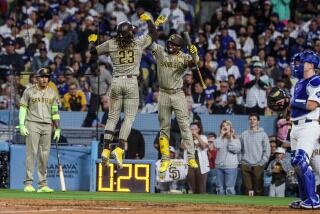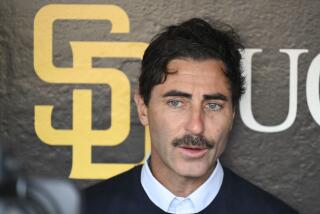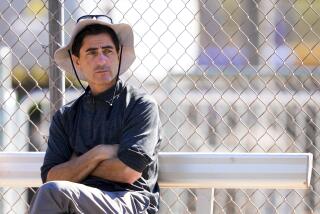‘OLD MAN’ TEMPLETON : Padres’ Captain Says He Has Good Years Left at Shortstop
- Share via
CHANDLER, Ariz. — During infield practice before an exhibition game against the Milwaukee Brewers earlier this spring, Padre shortstop Dickie Thon raced to his right, backhanded a sharp grounder and threw a strike to first from deep in the hole.
Garry Templeton, the Padres’ starting shortstop and captain, yelled, “Good play, Dickie.”
He gave Thon a high-five, and they laughed together.
If you wondered how Templeton--coming off the worst and most frustrating season of his 11-year career--was dealing with having competition in training camp for the first time since he came to the Padres seven years ago, the exchange with Thon tells some of the story.
“We’re teammates right now,” Templeton said. “Anything I can do to help anybody, I’m going to do it. I’m not a selfish person. I want to see everybody do well, whether he comes in at my position or somebody else’s position. The only thing I’m concerned with is trying to get the best team out there that is going to win.
“I’m not concerned with whether or not this guy has the opportunity to take my job. Just like I said, if he’s going to take my job, he has to put on an awful damn good show.”
Padre Manager Larry Bowa has been impressed with Thon, a former Astro all-star whose vision was impaired when he was beaned in 1984. Thon was placed on the disqualified list by the Astros last July 3 after he spent much of the season on the disabled list. He was signed by the Padres as a free agent before spring training.
Bowa wants to use Thon mostly at second base and shortstop. That plan would include more rest for Templeton.
“It’s only good for the organization,” Templeton said. “Since I’ve been here, as far as infielders, they only had one good backup shortstop in the organization (Mario Ramirez), and then they got rid of him. Since then, they never did have a backup shortstop.”
So Templeton, saddled with a bad left knee, played in 148 games in three of the past four seasons and in 147 games in 1986.
“Having Dickie around will help out,” Templeton said. “It makes it easier for me. It always makes a difference when you get a chance to get that breather, get a rest, gather your thoughts. That means if some guy is struggling in the infield, that gives the other infielder a chance to play for a couple of days and give the other guy a chance to think about what’s been happening.”
Templeton, who turned 32 Thursday, would have welcomed those breathers last season when he suffered through what he terms a “frustrating and terrible year.”
Despite all the talk about his fragile knees, Templeton says the mental part of the game--specifically, a lack in concentration--was responsible for last season’s .222 average, 56 points below his career mark.
“Somewhere along the line, my concentration went, and I wasn’t able to get it back,” Templeton said. “My concentration, my mental attitude just wasn’t there to go out and achieve the things I wanted to achieve.”
Templeton, who was named the team captain by Bowa before last season, wanted to be a successful captain as well as a player. He says that created an additional burden that affected his play.
“Mentally, I put too much pressure on myself to perform and do well,” Templeton said. “I did a lot of things I normally don’t do as far as hitting is concerned. . . . Playing with a lot of kids for the first time in my career, I think I put added pressure on myself to perform good and do well so that the young kids would take hold and notice a lot of the things that I do during the season.
“After the season, I realized that was something I had never done to myself in any shape, form or fashion as far as sports was concerned. I just went out there and tried to play as hard as I could, trying to do the best I could--day in, day out. And I always got good results. That’s what I plan on doing this year. Just going out there and letting everything take care of itself.”
He spent the off-season thinking about this role, losing weight (to 182 pounds, the least he has weighed in a decade), playing golf (in the high 70s) and watching the Lakers (he loves their running game).
Physically, he feels fine. And he’s tired about hearing about his bad knees.
“Everybody keeps saying I have bad knees,” Templeton said. “I only have one bad knee, and I’ve been able to play in at least 145 games a year. That would have to tell somebody something. I can take the demanding schedule.”
Templeton, entering the final year of a $1 million-per-season contract, is enjoying a successful spring and seems ready to put last season behind him.
“I don’t think Tempy feels pressure,” infielder Tim Flannery said.
“Mentally is where I had to get myself together,” Templeton said. “In one’s own mind, he knows what he has to do to prepare himself for an upcoming season, especially after he had an off season in which he felt he should have done better. . . .
“Like they always say, baseball is 70% mental. When you have a 162-game schedule, 6 1/2 months, concentration plays a big part in it. Playing shortstop is real demanding, so you have a lot of things on your mind.”
Such as:
THIS YEAR
Is there more pressure on Templeton because the Padres obviously are going with youth and this is the final year of his contract?
“To tell you the truth, I haven’t really thought about it until people started asking about it,” Templeton said. “All I was thinking about was coming out and having a good year and helping the team win.”
Templeton says he is in his prime and plans to play at least five more years after this season.
“That would give me 17 (full) years, and I’ll still get out at 37, which is a young man,” Templeton said. “Any time you can play 16, 17 years in the National League, I think that’s a great accomplishment in itself.”
He would like to finish his career with the Padres but must wait and see.
So will the Padres.
“He’s still a pretty good player,” said Jack McKeon, the Padre general manager. “Where do you find three better shortstops, defensively, in the National League than Tempy?”
McKeon said it’s premature to discuss Templeton’s future.
“Let him play the season,” McKeon said.
If Templeton does not remain in San Diego, he says he plans to play elsewhere.
His teammates jokingly refer to him as “Old Man” and “Gramps.”
“I’m still in my prime,” Templeton said. “It’s just that I’ve been playing for a long time.”
HITTING OR LACK OF IT
“I’m telling you, he (Templeton) might be the next guy to get 4,000 hits. If he wants to play until he’s 40, he might make a run at Ty Cobb. I’m serious. I’m deadly serious.”
--Keith Hernandez,
Cardinal first baseman, 1979
In 1979, Templeton hit .314 with 211 hits and was the first switch-hitter in history to get 100 hits from each side of the plate.
“A Mays . . . A Mantle . . . A Templeton. Who else? There aren’t too many.”
--Lou Brock, 1978
After 11 seasons, Templeton has 1,691 hits.
In five seasons with the Cardinals, Templeton hit .305 and was among the best and most graceful fielders in the league.
“He could do everything on the field,” said Bowa, who remembers playing against Templeton.
In six seasons with the Padres, Templeton has hit .247, .263, .258, .282 (was the Padre MVP in 1985) .247, .222.
What happened?
In St. Louis, Templeton played on artificial turf, where hard grounders went through the infield. In San Diego, those same grounders are outs.
He is not as fast as he used to be. So much for legging out infield hits.
The biggest change, Templeton said, is that he has been hitting eighth with the Padres. He batted leadoff or second with the Cardinals.
“When you bat eighth, you don’t get anything to hit,” Templeton said. “Everybody in the league knows I’m a real good fastball hitter. Batting eighth is not a fastball-hitting spot. Pitchers don’t give you that good fastball to hit. I’m going to get more slop. I’m going to get my share of off-speed pitches.”
Knuckleballs, changeups, slow curves, junk . . . that’s what Templeton sees a lot. And he said when he does see a fastball, he’s so surprised that he’s often off-balance.
“When they do throw a fastball, you’re not ready to hit it,” Templeton said. “You’re either going to be too early on it or too late on it. You’re sitting back on the slop.”
There is also the problem of being too anxious and swinging at a fastball out of the strike zone. It might be the only fastball you see that day. Or week.
Being overanxious leads to overswinging. Templeton struck out a career-high 92 times last season.
During the off-season, he studied his at-bats on tape and discovered some mechanical flaws that he is working to correct.
Templeton says he would hit between .280 and .300 if he saw the same pitches the top six hitters in the lineup see. He says he could hit between .280 and .300 batting eighth, but he would have to become more patient and selective at the plate. He says he would have to walk between 40 and 60 times, including the numerous intentional walks No. 8 hitters receive. He has had more than 40 walks just twice in the past six seasons and walked just 21 times in 1983.
“Mentally, I have to prepare myself to perform the task of batting eighth,” Templeton said.
A Mays? A Mantle? How times change.
THE TRADE
The irony of the deal that sent Templeton from the Cardinals to the Padres for shortstop Ozzie Smith in 1982 is that the Padres acquired Templeton because they didn’t think they could re-sign Smith and because they needed more punch at the plate.
In his upcoming book, “Jack of All Trades,” McKeon writes: “We thought it was a hell of a deal: first of all, Tempy had been 10 times the hitter Ozzie was.”
While Templeton’s average has slipped, Smith’s has soared.
In addition to winning his eighth consecutive Gold Glove, Smith hit a career-high .303 with 75 RBIs last year. He stole 43 bases, scored 104 runs and made his seventh consecutive All-Star game appearance. He led NL shortstops in fielding with a .987 average, committing only 10 errors on 771 chances.
Templeton led all shortstops in putouts with 253, had a fielding average of .972 and committed a team-high 20 errors, many on balls other shortstops would not have gotten to. And there was no count of how many times he robbed hitters of hits in the hole or up the middle.
“I have the best seat in the house,” Flannery said. “He’s made plays that are very, very difficult look very easy.”
McKeon knows the numbers, but he won’t concede that the Cardinals might have gotten the better of the deal.
“People could say we goofed,” McKeon wrote. “I don’t. The Cardinals won the pennant with Smith; we won the pennant with Templeton. Hell, when I trade a guy, I hope he does well.”
The Cardinals won the National League pennant in 1982, ’85 and ’87 and the World Series in 1982. The Padres won the NL pennant in 1984 and lost to Detroit in the World Series.
“They are two of the best shortstops in the National League right now,” McKeon said.
MODEL CITIZEN
Strangely, Templeton came to the Padres with a reputation as an excellent hitter with occasional attitude problems.
In 1981, after Templeton didn’t run to first base on a dropped called third strike, the St. Louis fans booed. And booed. Templeton responded with obscene gestures.
Templeton was hospitalized for what doctors called a “minor chemical imbalance.” He was traded to San Diego in the off-season.
“I like to give guys second chances,” McKeon said. “Usually, they turn out to be better.”
How right he was.
“I came over here and got with some real good people,” Templeton said. “Mr. (Ray) Kroc, Mrs. (Joan) Kroc (the team owners), I got around some real good people. When you get around real good people, you tend to change, too. That’s exactly what happened. I got around some good people, and they brought out the better side of me.”
Who will forget the inspirational lift he gave the Padres and their fans before Game 3 of the 1984 National League championship series against the Cubs? The Padres had lost two in a row in Chicago and came home needing to win all three games or be eliminated.
As the teams were introduced at San Diego Jack Murphy Stadium before the game, Templeton waved his cap around his head, exhorting the fans into a frenzy. It was a dramatic start of what became a dramatic comeback for the Padres, who defeated the Cubs in five games.
Now, Templeton is starting his second season as team captain.
“We’ve had no problem with Tempy since Day One,” McKeon said. “He’s been a positive influence on our ballclub. He’s a class kid. A quiet leader on this club.”
THE CAPTAIN
A quiet leader?
“He’s not quiet,” Flannery said. “If something needs to be said, he’ll say it. On our bus rides from the airport, he’s probably the most vocal of the players.”
And Templeton is planning to be even more so this season.
“The only thing that will probably change is I’ll probably be a little more vocal on the bench during the game and a little bit more in the clubhouse,” Templeton said. “But I’m not going to get to the point where I’m going to be trying to embarrass anybody, because I don’t like to do that.”
Being captain is a responsibility Templeton takes seriously, an honor he cherishes.
“Being captain is great,” he says. “That means a lot of players on the team have a lot of respect for you, and it shows the manager has a lot of respect for you. It’s a great feeling and great accomplishment because a lot of great athletes went through their careers and were never named captain.”
THE FUTURE
The contract Templeton signed with the Padres in 1985 guaranteed him a minimum of $9.85 million through the year 2019. He received a signing bonus of $450,000, with $300,000 deferred. He received $1 million a year from 1985 through 1987, $300,000 deferred annually, and will receive the same this season. He also will receive $230,000 annually from 1990 to 2019.
He is quite comfortable. He and his wife, Glenda, have three children; sons Garry II (9) and Gerome (6) and daughter Genae Nicole (3). They have a beautiful home in Poway.
This will be Templeton’s 12th full season in the major leagues.
Why does he want to continue playing?
“Because I can still play,” he said. “If I felt when I went out on the ball field I was only going to embarrass myself, I would think about maybe hanging it up. Right now, I can still play.”
When Templeton’s playing days are over, he wants to stay in the game as a manager or front-office executive.
“I have such good rapport with players, with my teammates,” Templeton said. “Managing is something that is in the distant future for me. I’d love to manage. It’s demanding. But playing shortstop every day in the big leagues is demanding, dealing with everyday life is demanding. . . . I’ve been around long enough, and I think I know a lot about the game. I know a lot about people and know that I can get the job done in (the front office), too.”
In addition to playing lots of golf and watching lots of basketball during the off-season, Templeton says he has been preparing himself for life after shortstop.
“Nobody knows it, and I’m not going to tell anybody what I’m doing as far as preparing myself,” Templeton said. “But I’ve been preparing myself so my transition is not going to be that tough.”
It’s a transition that he does not plan to make for some time.
More to Read
Go beyond the scoreboard
Get the latest on L.A.'s teams in the daily Sports Report newsletter.
You may occasionally receive promotional content from the Los Angeles Times.










